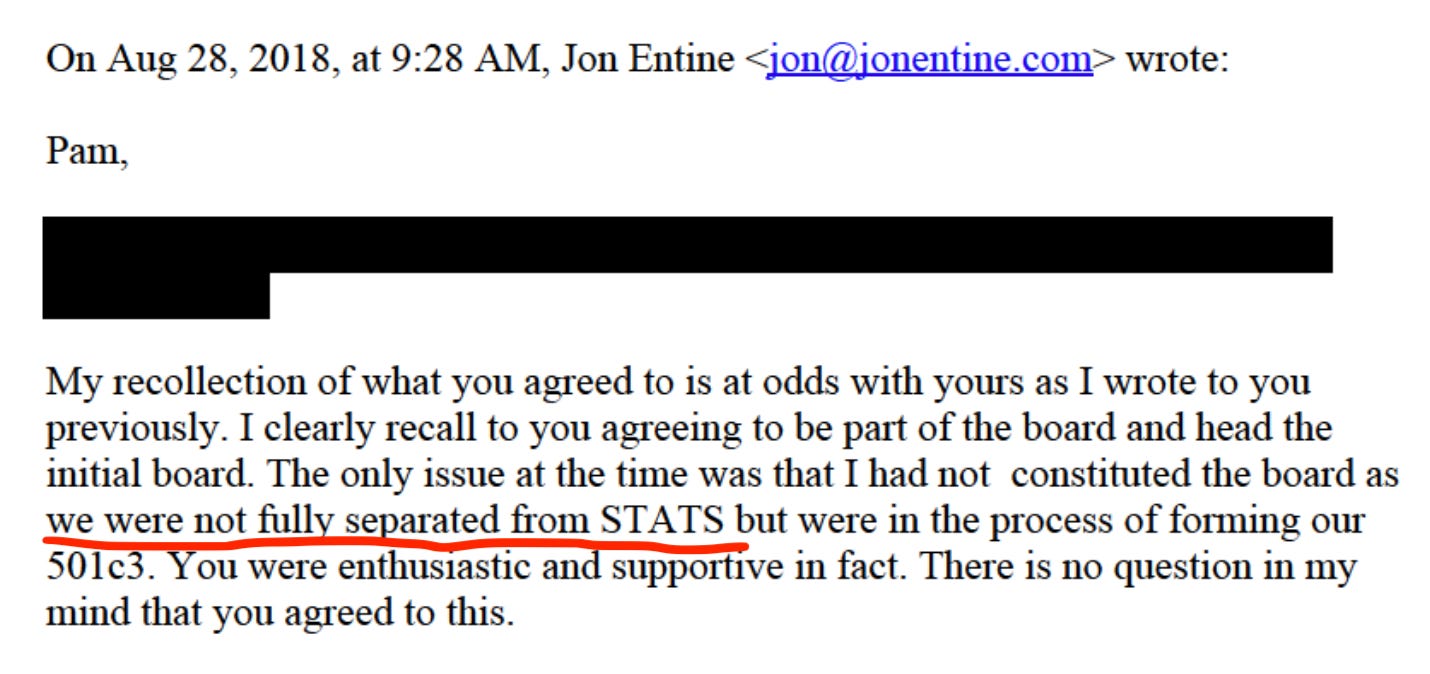Stat Called Out for Conflicts of Interest Once Again, But Is Unlikely to Change
How can journalists funded by Bill Gates investigate the COVAX vaccine program which is funded by Bill Gates?
5 minute read
Last week freelance journalist Timothy Schwab wrote a long thread about undisclosed conflicts of interest in a story co-reported by Stat and The Bureau of Investigative Journalism. Several hundred people retweeted Schwab’s thread as he explained the issue: he had been invited to join reporting on the article but declined because it investigated COVAX, a program to provide access to vaccines that has been funded by the Gates Foundation. And here is the problem: The Bureau of Investigative Journalism (TBIJ) is also funded by the Gates Foundation.


How could a news organization funded by Gates investigate a vaccine program funded by Gates? Seems impossible, no?
At the bottom of the article, TBIJ had this disclosure:
This article is part of our Global Health project, which has a number of funders including the Bill & Melinda Gates Foundation. None of our funders have any influence over the Bureau’s editorial decisions or output.
On Twitter, Schwab got a response from Gideon Gil, managing editor of Stat.


Schwab was not satisfied with Gil’s answer, and why should he be? Within the last couple of years, Schwab has written highly regarded stories about Gates’s funding of journalism that shines a flattering light on Gates, as well as an investigation of Gates’s funding for public health initiatives from which Gates also makes money through investments. On top of this, climate scientists have condemned Gates’s climate change philanthropy as ineffective, and experts in agriculture have decried Gates’s funding for the Cornell Alliance for Science because it produces unscientific propaganda for the agrichemical industry.
But the point Schwab was missing is that Gil is likely not focused on conflicts of interest, because Stat has always had a problem with conflicts of interest. And Stat is highly, highly, highly unlikely to focus specifically on conflicts of interest involving a press baron billionaire, because Stat is itself founded by another press baron billionaire—John W. Henry.
This has never been hidden. When Stat launched, founder John W. Henry wrote an essay explaining that he decided to start Stat over a dinner in Boston, meeting the next day with Rick Berke at the Boston Globe. Berke later became the co-founder and executive editor of Stat. Pictured next to Berke on Stat’s masthead is Henry’s wife, Linda (Pizzuti) Henry, who John W. Henry made the CEO of Boston Globe Media Partners.
This year, Forbes placed Henry at #318 on its list of the wealthiest Americans and estimated his net worth at $3.6 billion. And when you’re rubbing shoulders with a billionaire and his wife paying your salary, it might be a tad hard for editorial staff to stay militantly focused on the vast problems of billionaire Bill Gates funding journalism and public health programs.
Maybe. Just a teensy bit.
Or maybe this is just another example of Stat failing to comprehend obvious conflicts of interest?
I stopped following Stat some years back because, like many people, I just find them a tad too friendly with industry. The final straw was sloppy, unprofessional behavior by Patrick Skerrett, who runs Stat’s First Opinion page.
Back in late 2017, Skerrett was sideswiped with a First Opinion essay he ran by a physician praising drug company sales representatives—but who had the piece ghostwritten for him. Oh, and the piece also did not disclose that the physician had taken $300,000 from the drug industry according to the federal Open Payments database. (Since we’re being all up front about conflicts of interest, I wrote and helped pass the bill for the Open Payments law.)
This tawdry tale was first uncovered by multiple people on Twitter and caused Stat to retract the piece and institute some reforms for essays at First Opinion. But Skerrett was then hit with yet another scandal when a patient who praised TV drug ads revealed that a pharma PR company asked her to write another essay in First Opinion. (Are you seeing a pattern?)
This should have served as a warning to me, but nonetheless. In January 2018, I wrote a First Opinion essay for Skerrett about the long history of fake news promulgated by sites such JunkScience.com and the Genetic Literacy Project. As I wrote for Stat, JunkScience.com was a website run by Steven J. Milloy, who I had exposed for being on the tobacco payroll, while he was a science columnist for Foxnews.com.
I also discussed a group called Statistical Assessment Service or STATS (a group with no relation to the news site Stats) that had a history of putting out disinformation and climate denial. STATS later gave birth to another group called the Genetic Literacy Project, run by Jon Entine, who also ran a PR firm. The two groups had long shared the same office and website. However, STATS had gone defunct, and the Genetic Literacy Project had taken over the nonprofit tax ID 52-1844456 from STATS.
Maybe this was obvious to me because I spent years on the U.S. Senate Finance Committee where I worked with tax attorneys who wrote tax laws and investigated corruption in nonprofits. But pretty much anyone who investigates nonprofits knows that when you pass off the nonprofit tax ID number from one organization to another—as STAT did with the Genetic Literacy Project—then that first organization birthed the second.
It’s not complicated.
But that’s not the case with Patrick Skerrett. He later took out that paragraph and added this correction:
Correction: Three sentences were deleted from this article because of an unsupported statement about the origin of the Genetic Literacy Project (founder Jon Entine says he created it independently) and an editing error that made it appear the organization has received funding from Monsanto.
I then sent a long email to Stats editors Rick Berke and Gideon Gil explaining how the two were not independent and that STATS had passed off their nonprofit to the Genetic Literacy Project. I also attached the IRS forms for both groups showing the same tax ID.
“I am requesting that you make an appropriate correction to the story, noting that Statistical Assessment Service became Genetic Literacy Project, as I had originally in the article,” I wrote Berke and Gil.
Nothing. Complete silence.
Some months later, emails became public that made it all rather clear that Skerrett, Berke, and Gil didn’t have a handle on what they were doing. In an email that became public through a freedom of information act request, Jon Entine admitted the obvious: the Genetic Literacy Project was part of STATS.
A year later, Bayer put to rest Skerrett’s other silly correction mistake regarding the alleged independence of the Genetic Literacy Project from Monsanto, which had been bought by Bayer. As I reported for HuffPost, Bayer wrote in a statement that the company “no longer provides financial support” to the Genetic Literacy Project.
To those of you working at Stat, the phrase “no longer provides financial support” means that Monsanto once did.
Since my debacle with Stat’s editors, I’ve somewhat followed/somewhat ignored the continued problems they have had with conflicts of interest. In 2018, HealthNewsReview.org quoted me discussing yet another First Opinion essay at Stat that had hidden financial interests.
Reporters at Stat told me that problems were endemic with the First Opinion page, and one of the editors at HealthNewsReview.org said it probably didn’t make much sense to keep reporting about their errors, because Stat didn’t seem to care.
HealthNewsReview.org has lost most of its funding and is now mostly silent. But last February, they ran another in-depth look at yet another misleading First Opinion essay.
A visiting fellow at the Boston-based Pioneer Institute wrote a scare-mongering essay to warn patients that they would be harmed by a Biden administration review board of pricey pharmaceuticals. It was later revealed that the author had spent years in charge of corporate communication at Pfizer, and the Pioneer Institute was largely funded by … Pfizer!
We should all applaud Tim Schwab for stating the obvious and trying to hold news organizations’ feet to fire for painfully evident and clearly wrong financial conflicts of interest. But in too many cases, journalists ignore the heat and enjoy toasting their feet at the hearth of a warm, comforting and crackling fire, with wood supplied from a billionaire’s log pile.
CLARIFICATION: James Ball, Global Editor of the TBIJ, contacted The DisInformation Chronicle to note that they disclosed the Gates funding at the bottom of the published article. (This has been corrected, above.)
Mr. Ball added, "What we had missed on this occasion – and this was a slip-up by the editing team (myself included) – was that we would, when reporting on an issue that touches on a funder, also mention the funding inline in the copy. Tim was absolutely right to note that we hadn't included this, and we thanked him for noting that and added it promptly. But it is not true to say there was no disclosure at any point."




